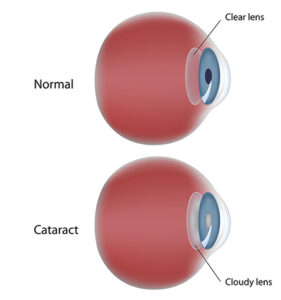Posted by: Eye Specialists of Mid Florida in Blog

Approximately 25 million Americans have cataracts, which cause cloudy, blurry, or dim vision and often develops with advancing age. This June, Eye Specialists of Mid-Florida joins with the American Academy of Ophthalmology in observing Cataract Awareness Month by sharing information everyone should know about the condition and its treatment.
As everyone grows older, the natural lenses of their eyes thicken and become cloudier. Eventually, they may find it more difficult to read street signs. Colors may seem dull. The trouble with night driving due to glare from oncoming headlights is frequently an early problem. These symptoms may signal cataracts, which affect about 70 percent of people by age 75. Fortunately, cataracts can be corrected with surgery. Ophthalmologists, physicians who specialize in medical and surgical eye care, perform around three million cataract surgeries each year to restore vision to those patients. The following are facts people should know about the condition.

- Age isn’t the only risk factor for cataracts. Though most everyone will develop cataracts with age, recent studies show that lifestyle and behavior can influence when and how severely you develop cataracts. For example, diabetes, extensive exposure to sunlight, smoking, obesity, high blood pressure, and certain ethnicities have all been linked to an increased risk of cataracts. In addition, eye injuries, prior eye surgery, and long-term use of steroid medication can also result in cataracts.
- Cataracts cannot be prevented, but you can lower your risk. Wearing UV-blocking sunglasses and brimmed hats when outside can help. Several studies suggest that eating more vitamin C-rich foods may delay how fast cataracts form. Also, avoid smoking cigarettes, which have been shown to increase the risk of cataract development.
- Surgery may help improve more than just your vision. During the procedure, the natural clouded lens is replaced with an artificial lens called an intraocular lens implant, which should improve your vision significantly. Patients have a variety of lenses to choose from, each with different benefits. Studies have shown that cataract surgery can improve quality of life and reduce the risk of falling. If cataracts are interfering with your ability to see well, consider asking your ophthalmologist about cataract surgery.
After surgery, the vast majority of people have significant improvements in their vision. A large percentage even find they need glasses less often than they did before surgery.
In the last 60 years, there have been many improvements in technology, making cataract surgery an easier, outpatient procedure with very few activity restrictions post-operatively. Due to these improvements, cataract surgery has become one of the most successful and commonly performed operations. Most people find the operation very easy with little inconvenience. In addition, the various lens implants available give patients lifestyle choices on how they would like their vision corrected. A consultation with an ophthalmologist can help inform you about the choices available to you and help you understand the surgery and your options.
By: David M. Loewy, M.D. Board Certified Eye Surgeon
Bio: Ophthalmologist David Loewy, MD, specializes in laser, cataract surgery and LASIK, and other refractive procedures and practices at Eye Specialists of Mid-Florida.
